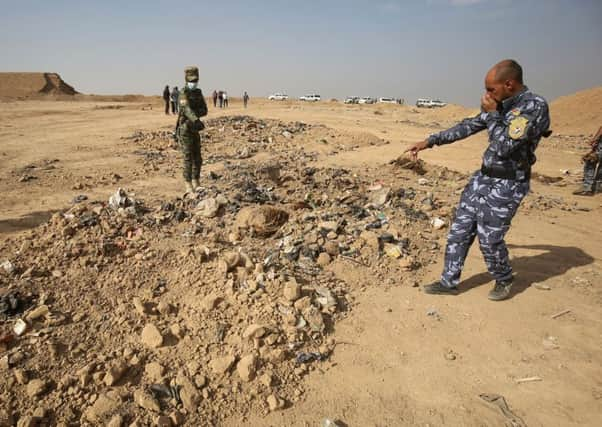Investigators probe mass grave found during Mosul advance


It appeared to be the latest of several mass graves found in territory retaken from IS, which massacred hundreds of people as it swept across northern and central Iraq in 2014 and is believed to have waged a brutal crackdown since the start of the Mosul offensive.
Footage from the site shows bones and decomposed bodies among scraps of clothing and plastic bags dug out of the ground by a bulldozer.
Advertisement
Hide AdAdvertisement
Hide AdIraqi troops noticed the strong smell while advancing into the town of Hamam al-Alil on Monday.
“Investigators flew in this morning and are on their way to the grave to conduct examinations and determine the cause of death,” said Haider Majeed, a Cabinet official in charge of mass grave investigations.
The first officials at the site have said the grave, behind an earthen embankment near an agricultural college, probably holds about 100 bodies, many of them decapitated.
The town lies some 19 miles from Mosul.
It was unclear who the victims were, but a soldier at the site pulled a child’s stuffed animal from the scraps of clothing and rotting flesh.
In Geneva, the UN human rights office said it was investigating whether the discovery at Hamam al-Alil was connected to reports about the alleged killing of police officers in the same area.
“We had reports that 50 former Iraqi police officers had been killed in a building outside Mosul,” spokeswoman Ravina Shamdasani said. “This building was actually the same agricultural facility that has been cited right now as the site of these mass graves.”
She said the UN had received reports alleging that IS last week abducted at least 295 former security forces personnel from villages around the northwestern town of Tal Afar, as well as the western Mawaly village area. The men’s fate is currently unknown.
Some 30 sheikhs were also reportedly taken from the Sinjar district, with one report saying that over half of them were killed. IS allegedly forcibly moved about 1,500 families to Mosul airport from Hamam al-Alil, she added.
Advertisement
Hide AdAdvertisement
Hide AdThe campaign to drive IS fighters from Mosul, Iraq’s second-largest city and the extremists’ last major urban stronghold in the country, began on 17 October.
Iraqi troops and Kurdish peshmerga forces are now converging on Mosul, although the deepest advance into an eastern sliver of the city has stalled after militants counterattacked from built-up, populated areas.
To the north-east, some eight miles from the city, the peshmerga continued their push on the town of Bashiqa, believed to be largely deserted except for dozens of IS fighters.
Mortar fire, automatic weapons and explosions rang out through the morning, as a thick plume of smoke hung over parts of the town, obscuring the view of aircraft.
The United Nations says over 34,000 people have been displaced from Mosul, with about three-quarters settled in camps and the rest in host communities.
In a report issued overnight, the UN human rights office said food, water and medicine had been distributed to more than 41,000 displaced people and vulnerable residents fleeing the fighting.
Since the battle for Mosul reached the city itself on 4 November, some 11,000 people have fled eastwards, while some electricity and water supplies have been cut.
In Baghdad, meanwhile, small-scale bombings killed at least eight people and wounded 28 others, according to police and medical officials, who spoke on condition of anonymity.